
Precision and sample-size analysis for
confidence intervals
ciwidth
January 23, 2020
1

Overview
• Introduction
• Precision and sample-size analysis
• Overview of ciwidth
• Inference using confidence intervals
• Examples
• One population mean
• One population variance
• Two paired means
• Two independent means
• Sensitivity analysis
• Custom tables and precision graphs
• Adding your own methods to ciwidth
• Summary
2

Introduction to precision and
sample-size analysis
3

Precision and sample-size analysis
• Hypothesis tests for inference
• Test that a population parameter of interest is equal, or smaller, or larger than a
specified value
• Power analysis estimates the required sample size for a future study to ensure
that the test will have higher power (chance) to detect when the parameter
estimate is different from the specified value
Confidence intervals for inference
Estimate an interval for the population parameter
Precision analysis estimates the required sample size for a future study to ensure
that the estimated interval will have the desired precision so that it is not too wide
ike hypothesis tests, confidence intervals are data dependent and so their precision
will vary across samples
Use precision and and sample-size analysis to account for the variability, and plan a
study with the desired precision
Precision and sample-size analysis for confidence intervals is analogous to power and
sample-size analysis for hypothesis tests
4

Precision and sample-size analysis
• Hypothesis tests for inference
• Test that a population parameter of interest is equal, or smaller, or larger than a
specified value
• Power analysis estimates the required sample size for a future study to ensure
that the test will have higher power (chance) to detect when the parameter
estimate is different from the specified value
• Confidence intervals for inference
• Estimate an interval for the population parameter
• Precision analysis estimates the required sample size for a future study to ensure
that the estimated interval will have the desired precision so that it is not too
wide
Like hypothesis tests, confidence intervals are data dependent and so their precision
will vary across samples
Use precision and and sample-size analysis to account for the variability, and plan a
study with the desired precision
Precision and sample-size analysis for confidence intervals is analogous to power and
sample-size analysis for hypothesis tests
5

Precision and sample-size analysis
• Hypothesis tests for inference
• Test that a population parameter of interest is equal, or smaller, or larger than a
specified value
• Power analysis estimates the required sample size for a future study to ensure
that the test will have higher power (chance) to detect when the parameter
estimate is different from the specified value
• Confidence intervals for inference
• Estimate an interval for the population parameter
• Precision analysis estimates the required sample size for a future study to ensure
that the estimated interval will have the desired precision so that it is not too
wide
• Like hypothesis tests, confidence intervals are data dependent and so their precision
will vary across samples
• Use precision and and sample-size analysis to account for the variability, and plan a
study with the desired precision
• Precision and sample-size analysis for confidence intervals is analogous to power
and sample-size analysis for hypothesis tests
6

Precision and sample-size analysis
• How many subjects would be required to ensure that the
confidence interval for the mean is no wider than 2?
• If we only have enough resources to include 40 subjects in
our study, what kind of precision would we expect our
confidence interval to have?
• How would this precision change as we increase our sample
size to 50, 60, and 70?
• The ciwidth command will help you answer these questions
and more
7

Overview of ciwidth
• Perform precision and sample-size analysis for confidence intervals
• Population mean
• Population variance
• Comparison of means from independent samples
• Comparison of means from paired samples
• Compute
• Sample size
• CI precision
• Probability of CI precision
• Perform sensitivity analysis
• Present results graphically or in a table
• Customize graphs and tables
• Add your own method
• Easily create tables and graphs as you would with official ciwidth commands
8

Computation of a
confidence interval
9

Confidence intervals
• Computation
• Confidence level
• 95%, 97%, other
• Sample size
• How many participants can you afford to have in your study?
• Standard deviation
• How did weight loss vary in the sample?
Precision
Measured by the confidence-interval width
Ensured by the probability of C.I. width
10

Confidence intervals
• Computation
• Confidence level
• 95%, 97%, other
• Sample size
• How many participants can you afford to have in your study?
• Standard deviation
• How did weight loss vary in the sample?
• Precision
• Measured by the CI width
• Ensured by the probability of CI width
11
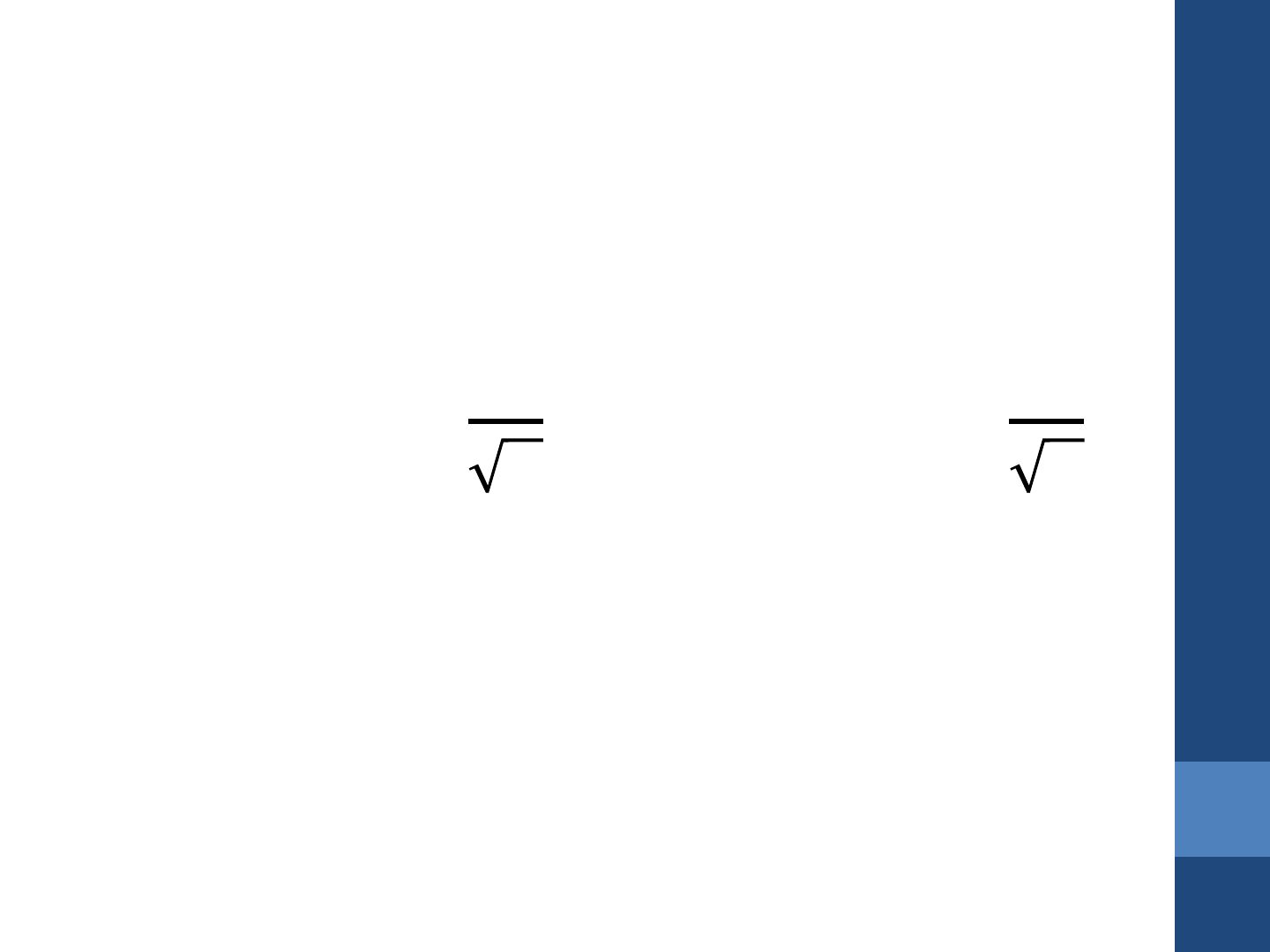
Confidence interval for a population mean
A 100*(1- α)% CI:
[ ҧ𝑥 - 𝑡
n-1,1-α∕2
(
𝑠
𝑛
) , ҧ𝑥 + 𝑡
n-1,1-α∕2
(
𝑠
𝑛
) ]
α = significance level
s = sample standard deviation
n = sample size
12

Confidence interval for a population mean
A 100*(1- α)% CI:
[ ҧ𝑥 - 𝑡
n-1,1-α∕2
(
𝑠
𝑛
) , ҧ𝑥 + 𝑡
n-1,1-α∕2
(
𝑠
𝑛
) ]
α = significance level
s = sample standard deviation
n = sample size
Τ
1
2
width
Τ
1
2
width
13

Confidence interval for a population
mean
[ ҧ𝑥 - 𝑡
n-1,1-α∕2
(
𝑠
𝑛
) , ҧ𝑥 + 𝑡
n-1,1-α∕2
(
𝑠
𝑛
) ]
Sample mean Width Sample mean ±
half-width
95% Confidence interval
5 10 5-5, 5+5
5 8 5-4,5+4
5 4 5-2, 5+2
0 10
3 7
1 9
14

Confidence interval for a population
mean
[ ҧ𝑥 - 𝑡
n-1,1-α∕2
(
𝑠
𝑛
) , ҧ𝑥 + 𝑡
n-1,1-α∕2
(
𝑠
𝑛
) ]
Choose the values of the confidence
level (100*(1-𝛼)), sample standard
deviation, and sample size
that will provide the desired level of
precision, given the resources you have
15

A first example
16

Precision analysis for a population mean
• How long do plug-in air fresheners last?
• How many air fresheners would we need to
test to obtain a two-sided 95% CI for the
mean scent duration with a width no larger
than 4 days?
17

18

19

20

21

Computing sample size for a population
mean
22

Computing CI width for a population mean
How big of an interval width would we
expect if we could only afford to
sample 30 air fresheners?
23

Computing CI width for a population mean
24

Computing probability of CI width for a
population mean
What’s the probability that we’ll obtain
a desired CI width of 4, if we only
sample 30 air fresheners?
25

Computing probability of CI width for a
population mean
26

Syntax overview for a one-mean CI
• Estimate sample size
• ciwidth onemean, sd(6) probwidth(0.96) width(4)
• Estimate CI width
• ciwidth onemean, sd(6) probwidth(0.96) n(30)
• Estimate probability of CI width
• ciwidth onemean, sd(6) width(4) n(30)
27

General syntax for ciwidth
• Estimate sample size
• ciwidth method …, probwidth() width() …
• Estimate CI width
• ciwidth method …, probwidth() n()…
• Estimate probability of CI width
• ciwidth method …, width() n()…
method:
onemean
onevariance
twomeans
pairedmeans
usermethod
28

General syntax for ciwidth
• Estimate sample size
• ciwidth method …, probwidth(numlist) width(numlist) [options]
• Estimate CI width
• ciwidth method …, probwidth(numlist) n(numlist) [options]
• Estimate probability of CI width
• ciwidth method …, width(numlist) n(numlist) [options]
method: options:
onemean table
onevariance graph
twomeans lower
pairedmeans upper
usermethod …
29

Finite populations
30

Infinite vs. finite population
• We’ve been performing our analyses for a confidence
interval for the mean scent duration of all plug-in air
fresheners (infinite population).
• But the parameters you are estimating may be for a
fixed population. For example, there are only 500
models of the Bugatti Chiron. (finite population).
• Apply a finite population correction with the fpc()option.
31

Finite population
• Suppose you work for this car manufacturer and
you’re designing a study to estimate a confidence
interval for the maximum speed of this limited
edition model.
• What is the largest estimated width for the
maximum speed you’ll obtain if you only sample
50 out of the 500 cars that were manufactured,
assuming a standard deviation of 16 mph?
32

Compute CI width using a finite population correction
33

Alternative specification for a finite population
correction
34

Finite population correction
35

Back to infinite populations of air fresheners,
and on to
one-sided confidence intervals
36

One-sided confidence intervals
• You may want one-sided confidence intervals if
• You are certain of the direction of an effect.
• Examples include toxicity studies and analysis of occurences of adverse drug
reaction data(Chow, Shao, Wang, & Lokhnygina, 2017).
• You are mainly interested in either the lower or upper limit.
• An example would be product quality and reliability (Meeker, Hahn, & Escobar,
2017 ).
• In general, use caution with one-sided confidence intervals.
• There have been cases where the placebo effect is superior to the
actual drug effect (Meeker, Hahn, & Escobar, 2017).
37

Lower 95% confidence interval
38

Two-sided 90% confidence level
39

Sensitivity analysis
• Precision and sample-size analysis is centered on a
prospective study, and we are obtaining estimates based
on values that are truly unknown
• Estimates may come from historical data or pilot studies
• Sensitivity analysis is used to investigate the effect of
varying study parameters on CI precision, probability of CI
width, sample size, and other components of a study.
• In Stata, you can perform sensitivity analysis with tables and
graphs.
40

Computing probability of CI width for a
population mean
41

Probability of CI width for a range of
standard deviations
42

Table and graph for sensitivity analysis
43
<output omitted>

Sensitivity analysis graph
44

Probability of CI width for ranges of multiple
parameters
45
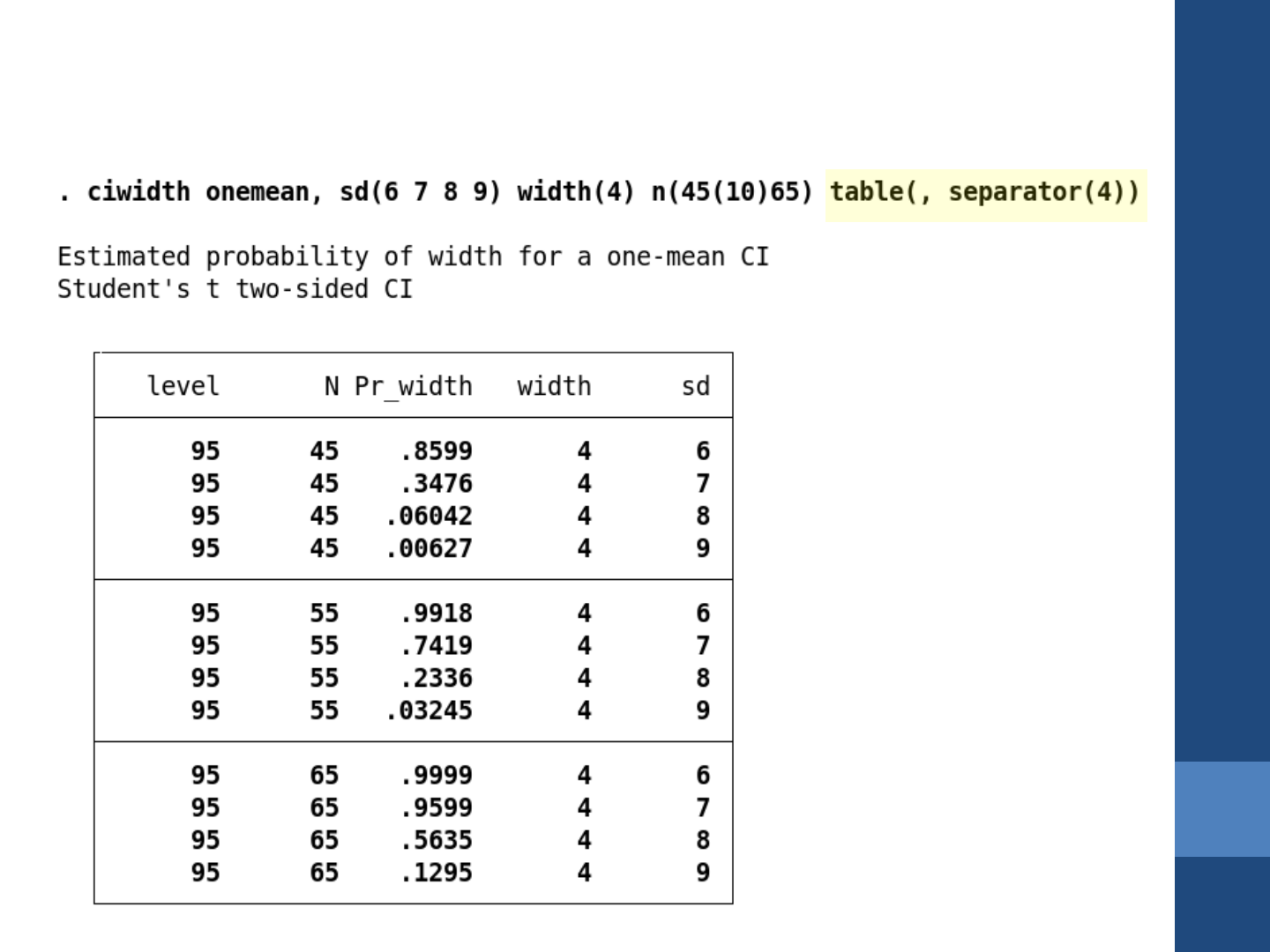
Tables for sensitivity analysis
46

Reordering table columns
47

Modifying column labels and widths
48

ciwidth
• We computed the following for the CI for a population mean
• Sample size
• Confidence-interval width
• Probability of confidence-interval width
• We created a graph and tables for sensitivity analysis
• We can perform precision and sample-size analysis for CIs for
any of the following
• A population mean
• A population variance
• A difference between two independent means
• A difference between paired means
49

Precision analysis for a
population variance
50

Computing probability of CI width for a
population variance
51

Computing probability of CI width for a
population variance
52

Computing sample size for a population
standard deviation
53

Sensitivity analysis for a population
standard deviation
54

Paired samples
55
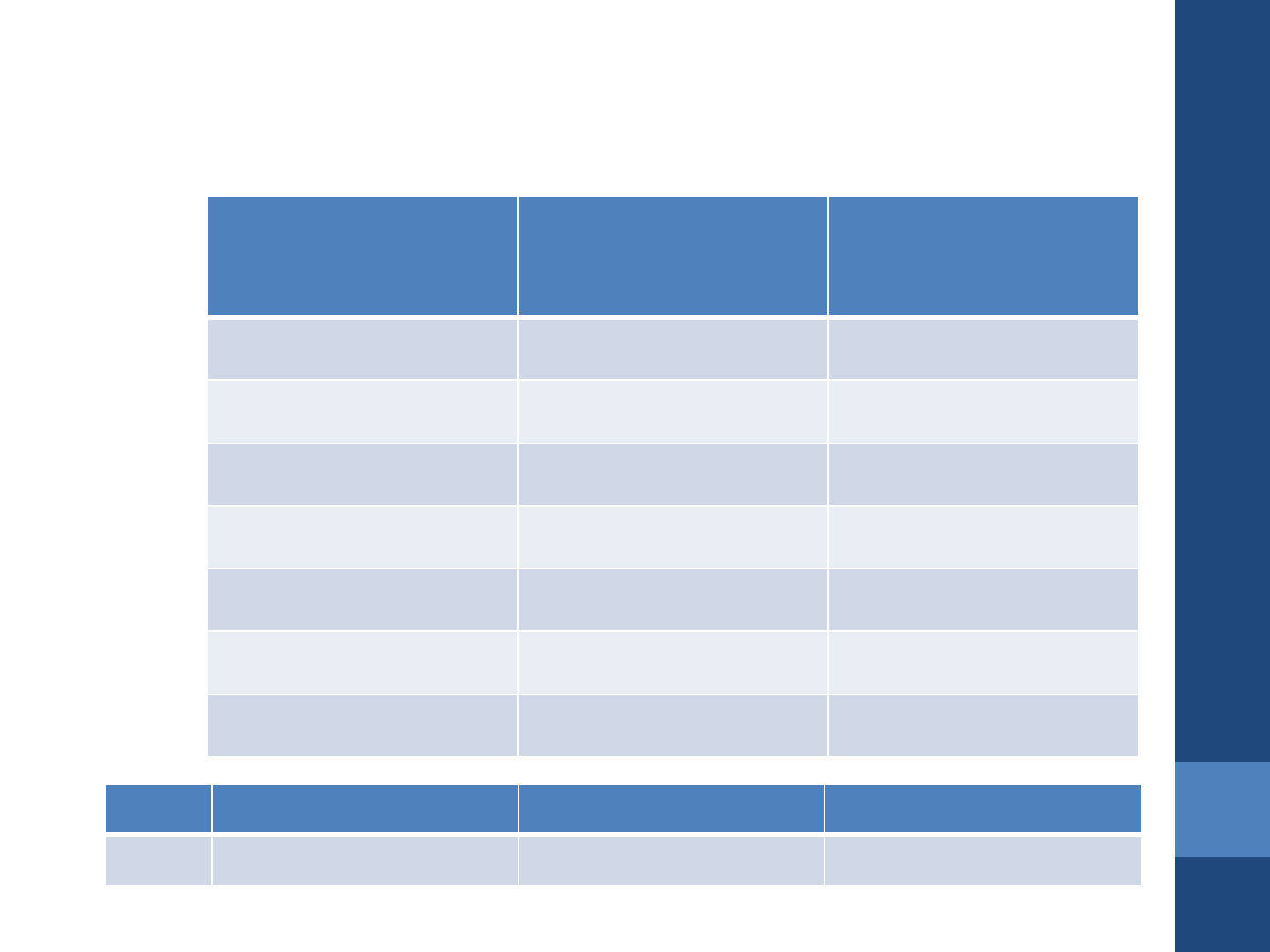
Paired-means for bad (LDL) cholesterol levels
Cholesterol
Before
(mg/dL)
Cholesterol
After
(mg/dL)
Difference
167 140 -27
149 138 -11
192 194 2
200 180 -20
162 162 0
52 41 67.25
… … …
Mean
129.58 111.96 -17.62
S.D.
52.27 42.15 6.47
56

CI for a paired-means difference
57

CI for a paired-means difference
58

Fractional sample sizes
59

Sample-size determination using the correlation
60

CI for a difference of two means
• Let’s consider the cholesterol example, but
instead randomly sample individuals who take
cholesterol medication and individuals who don’t
• Two independent samples
• Group sizes may differ
61

CI for a difference of two means
62

Graphs for sensitivity analysis
63

Define the x axis
64

Label distinct values on the y axis
65

Specifying multiple values for multiple parameters
66
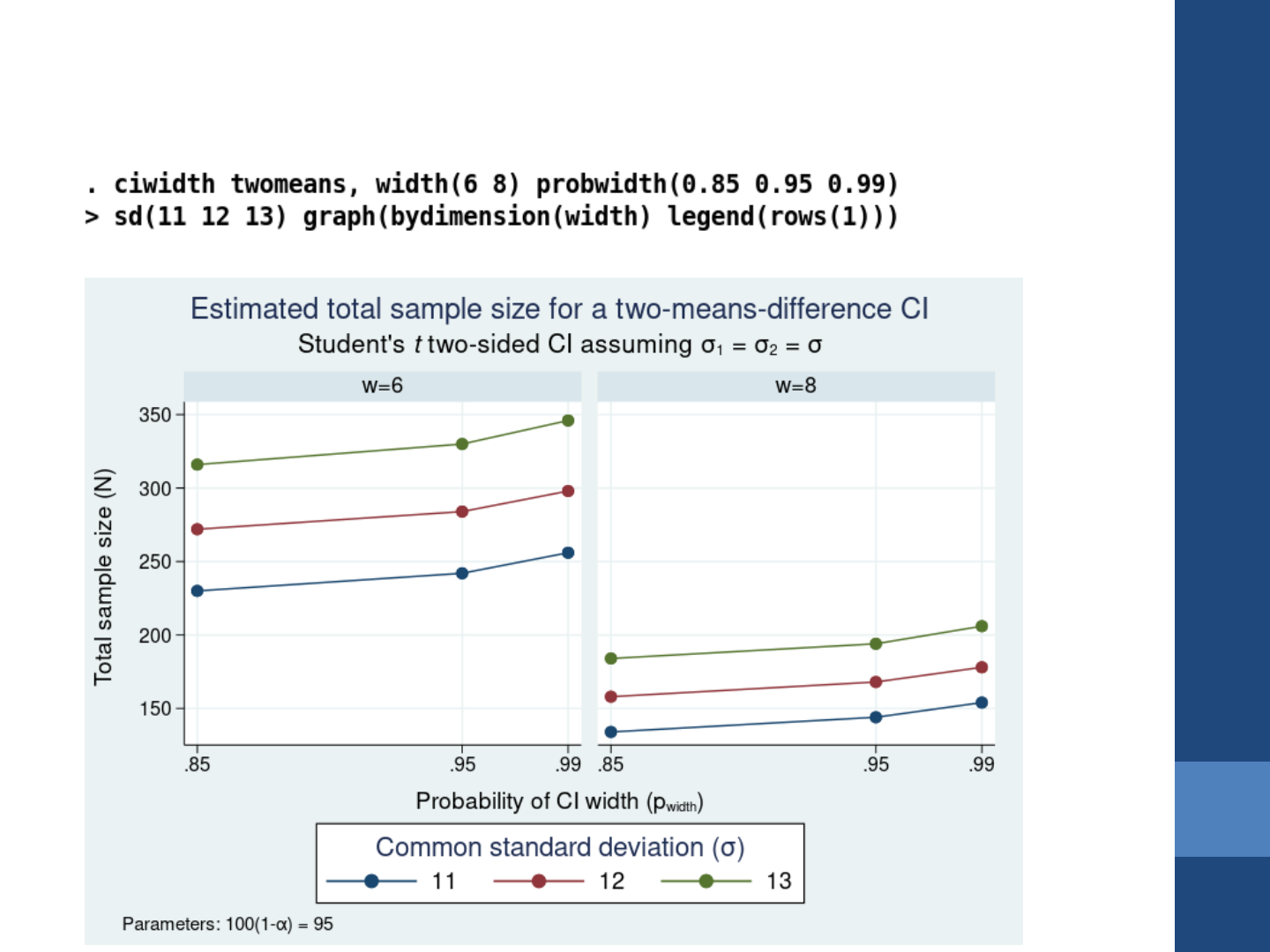
Create subgraphs for values of width
67

Unbalanced sample sizes
Control group
(No medication)
Experimental group
(Medication)
68

Unbalanced sample sizes
69

Unbalanced sample sizes
70

Unbalanced sample sizes
71

Unbalanced sample sizes
72

Compute one sample size given another
73

Compute one sample size given another
74
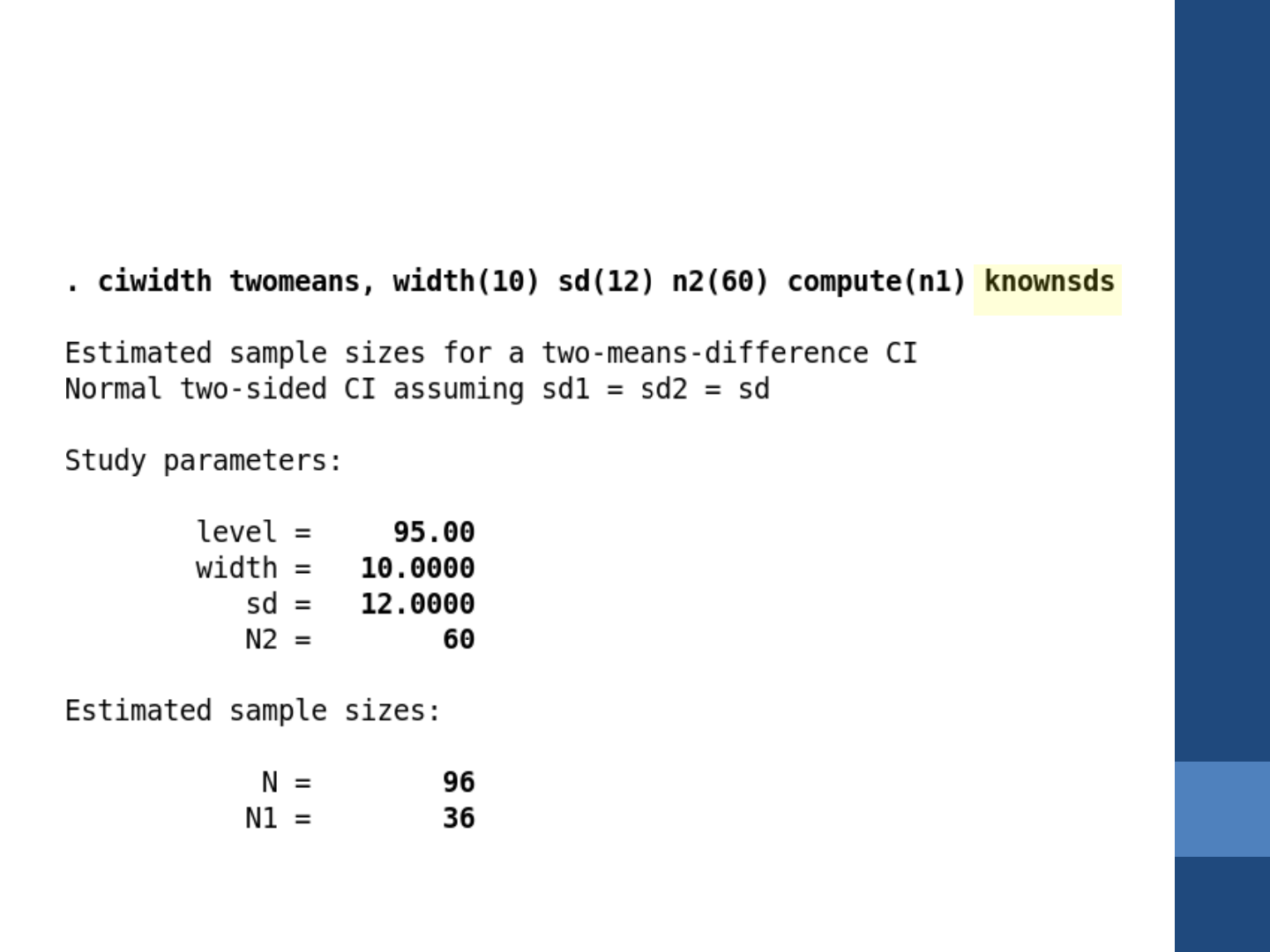
Known standard deviations
75

Do you have another method in mind?
computations in the same way you would with other ciwidthcommands,
and create tables and graphs
76

Adding your own method to ciwidth
Adding your own methods to ciwidth is easy. Suppose
you want to add a method called mymethod to ciwidth.
Simply
1. write an r-class program called ciwidth_cmd_mymethod that
computes sample size, probability of CI width, or CI width and
follows ciwidth’s convention for naming common options and
storing results; and
2. place the program where Stata can find it.
You are done. You can now use mymethod within
ciwidth like any other official ciwidth method.
77

Program for computing CI width
program ciwidth_cmd_mymean, rclass
version 16.0
78

Program for computing CI width
program ciwidth_cmd_mymean, rclass
version 16.0
syntax, n(integer) [ Level(cilevel) Stddev(real 1) * ]
79

Program for computing CI width
program ciwidth_cmd_mymean, rclass
version 16.0
syntax, n(integer) [ Level(cilevel) Stddev(real 1) * ]
tempname width
scalar `width' = 2*invnormal(1/2+`level'/200)*`stddev'/sqrt(`n')
80

Program for computing CI width
program ciwidth_cmd_mymean, rclass
version 16.0
syntax, n(integer) [ Level(cilevel) Stddev(real 1) * ]
tempname width
scalar `width' = 2*invnormal(1/2+`level'/200)*`stddev'/sqrt(`n')
return scalar level = `level'
return scalar N = `n'
return scalar width = `width'
return scalar stddev = `stddev'
end
81

Program for computing CI width
82

ciwidth mymean : compute CI width
83

ciwidth onemean : compute CI width
84
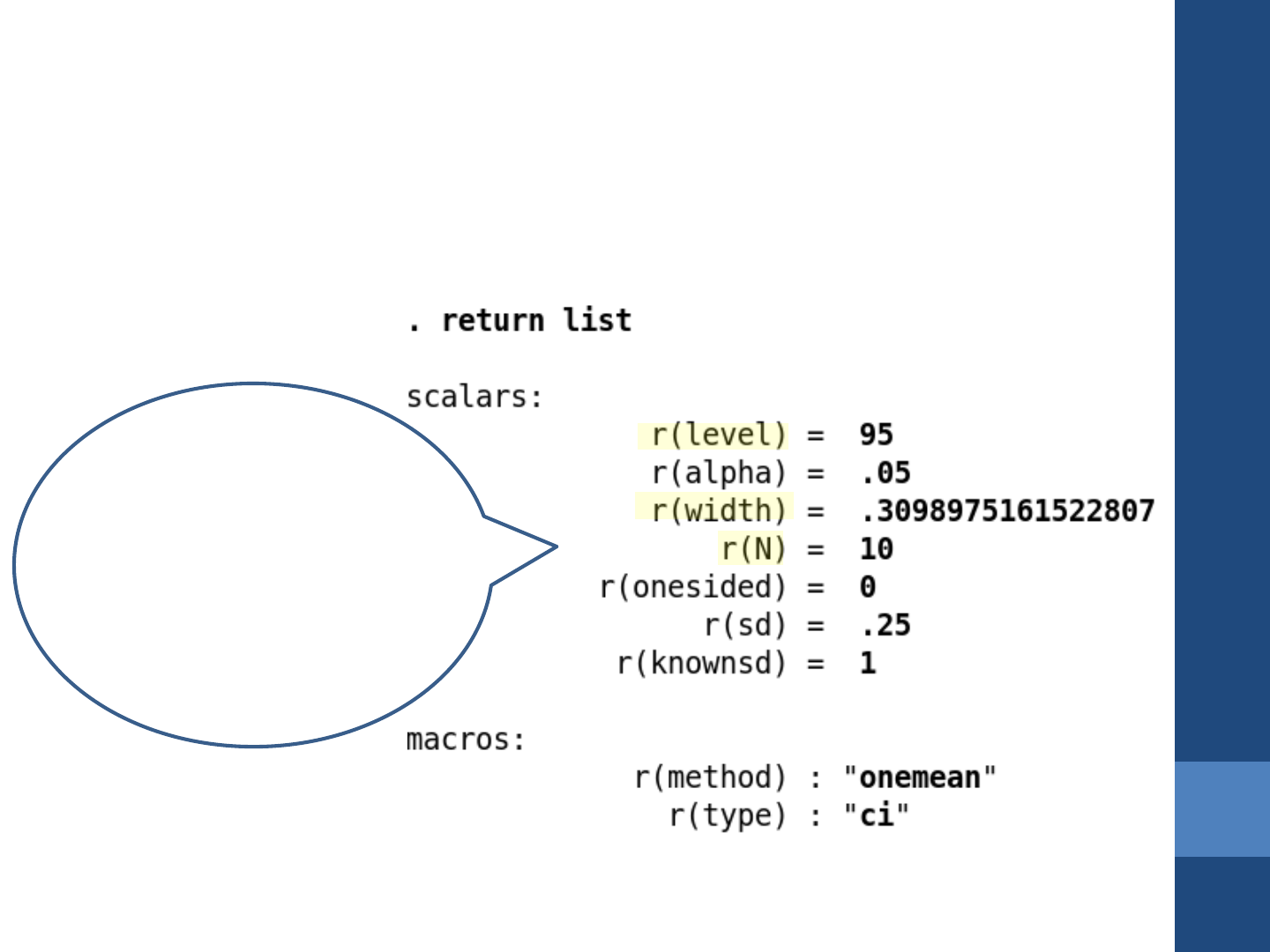
Naming conventions for stored results
return scalar level = `level'
return scalar N = `n'
return scalar width = `width'
85

ciwidth mymean : Specifying multiple values
86
We can also compute results for multiple sample sizes and confidence levels
without any additional effort on our part:

ciwidth mymean : Automatic graphs
87

Customizing your ciwidth command
• Add method-specific options and set them up to allow
multiple values
• Tables
• Change column labels, formats, and widths to modify the look and
contents for the table created by default
• Graphs
• Change the default column labels
• Use different symbols to label the results
88

Summary
• Perform precision and sample-size analysis for CIs for
• A population mean
• A population variance
• A difference between two independent means
• A difference between paired means
• Compute
• Sample size, CI width, and probability of CI width
• Perform sensitivity analysis graphically and with a table
• Implement your own method, and easily create tables
and graphs as if it were an official ciwidth command
89

References
• Dixon, W. J., and F. J. Massey, Jr. 1983. Introduction to
Statistical Analysis. 4th ed. New York: McGraw–Hill.
• Chow, Shein-Chung, J. Shao, H. Wang, and Y.
Lokhnygina. 2017. Sample Size Calculations in Clinical
Research. 3rd ed. Boca Raton: Taylor & Francis.
• Meeker, W. Q., G. J. Hahn, and L. A. Escobar. 2017.
Statistical Intervals: A Guide for Practitioners and
Researchers. 2nd ed. Hoboken, NJ: Wiley.
90

Thank you !!
91
